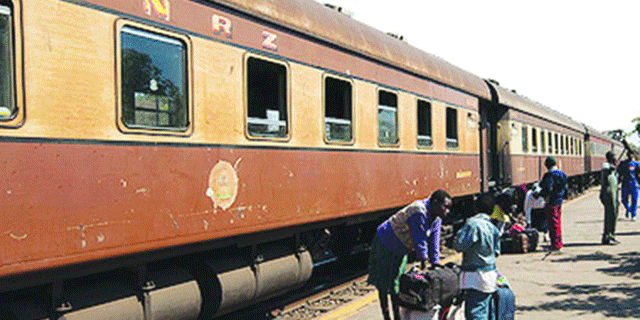
NATIONAL Railways of Zimbabwe acting general manager Lewis Mukwada yesterday told Parliament that the parastatal had no plans to reintroduce the “freedom trains” project as the move had proved to be non-viable.
VENERANDA LANGA STAFF REPORTER
Mukwada also said there was no specific infrastructure set aside for the freedom trains, adding that the platforms and coaches used in the project had been taken from the NRZ “graveyard”.
“Our freedom trains were now running empty and Zupco had made a comeback and so we stopped operating them because they were now running empty and they were loss making,” Mukwada told members of the Parliamentary Portfolio Committee on Transport and Infrastructural Development chaired by Zanu PF Epworth MP Amos Midzi.
“We had to stop our shunting movements so that commuter trains may run on time and we requested the government to allow us to stop running them.”
Mukwada, however, pleaded with government to continue investing in the NRZ saying although it was recording a loss of about $4 million each month, the parastatal was strategic to the economy and still had the capacity to record profits.
He said for NRZ to be viable they needed to transport about 400 000 tonnes of goods per month, but was currently at 297 000 tonnes.
“In 2000 we used to move 9,5 million tons but by 2009 we had declined to 2,6 million tonnes,” Mukwada said.
- Chamisa under fire over US$120K donation
- Mavhunga puts DeMbare into Chibuku quarterfinals
- Pension funds bet on Cabora Bassa oilfields
- Councils defy govt fire tender directive
Keep Reading
He said archaic locomotives and wagons, most of which were in the graveyard, had contributed to the parastatal’s failure to meet its targets.
Mukwada also cited low demand for services from companies like Hwange Colliery and Zimasco as contributing to the NRZ demise.
“The bulk of our fleet is over 30 years old. The youngest locomotives are at 21 years old and number only 13 and all our wagons are over 50 years old and it is very expensive to maintain them,” he said.
“Shunt yards are operating at 50%, while workshop equipment needs replacement.”
Mukwada said as at May their total revenue was $44,1 million against expenditure of $61 million and they accumulated a $17,5 million deficit.
NRZ salary backlog dates back to 2009 and was at $36,1 million as at May 2014 for the 6 500 employees, and what the company had been doing was to pay 50% salaries for higher grades and 70% for lower grades.
“We need $1,9 billion to recapitalise NRZ.
“A Canadian company CPCS came up with the figure and if we get $442 million we think we will be able to self-sustain for three years and for the next 10 to 15 years NRZ will be able to recapitalise itself.
“We are at the moment involved in negotiations with Development Bank of South Africa (DBSA) to finance the locomotives.
“We are also talking to (the) Infrastructure Development Bank of Zimbabwe to leverage on infrastructure bonds of $20 million for seven locomotives and 220 wagons,” he said.
NRZ finance director Levy Mayihlome said their total debts were $144 million and they were owed millions by other parastatals such as Ziscosteel, Grain Marketing Board and Zimbabwe Power Company.
Mukwada said infrastructure covering more than 290km meant for the electric train between Gweru and Harare had been vandalised.
He said there was need to bring the Railways Amendment Act before Parliament as it would ensure the government became responsible for NRZ infrastructure maintenance and the parastatal’s debts.










